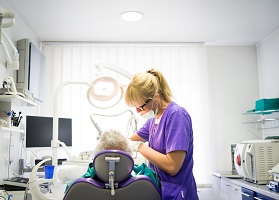In dentistry, informed consent is necessary. If a dentist does not receive informed consent from a patient, they are subject to legal issues. Due to the increasing use of technology, patients are able to understand their healthcare services better. Thus, allowing patients to be more involved in their treatment decision-making and be more informed.
A provider needs to inform patients of potential risks where there is a reasonable chance of a “serious” adverse outcome. Progress in healthcare technologies has enabled patients to be better informed about all aspects of healthcare.
The following Informed Consent in Dental Practice for Dental Healthcare Providers course is designed to educate dental healthcare providers (DHCP) on the importance of informed consent, the types of informed consent, and the dental procedures requiring consent.
What you’ll learn
-
Types of Informed Consent in Dental Practice
- About Dental Procedures Requiring Informed Consent
- Dental Photography & Personalized Consent Form
-
Informed Consent for Children
Details
Course length: 45 minutes; CEU: 0.75.
Languages: American English
Key features: Audio narration, learning activity, and post-assessment
Get Certified
American Medical Compliance (AMC) is a leader in the industry for compliance, Billing, and HR solutions. To become certified, please visit us at American Medical Compliance (AMC).
Reach out for other courses by AMC Course Library
The following training will teach dental health providers how to give informed consent to their patients adequately. Additionally, you will learn the importance of informed consent and the times when informed consent must occur. This course is derived from government sources and agencies.
Benefits of an Online Course
There are many advantages to taking an online course. Online courses are flexible and convenient. You can work them around your busy schedule. You’re allowed to take this course on your own time and in the environment of your choice. It can improve skills of self-management and self-discipline. This course can be easily taken and easily administered.
Introduction
With the recent improvements in technology, an endless amount of information is at everyone’s fingertips. Subsequently, advancements in healthcare technologies allow patients to be more informed about aspects of healthcare. Informed consent is the right of patients to take part in decisions related to healthcare treatment. This remains necessary even in cases when patients may be difficult to communicate with or younger patients.
Types of Informed Consent
Through this course, you will learn about three types of consent, verbal, written, and implied. You will learn how each of these types is different from one another and when to use them.
Procedures Requiring Informed Consent
A visit to the dentist implies the patient seeks an examination for potential treatment. All dental surgical procedures involve the potential for irreversible change in the patient and may come with unwanted side effects. It is important to document any condition changes and receive informed consent for any invasive or irreversible procedures.
Risks
A dental healthcare provider should inform patients of any potential risks that may come as a result of a procedure, especially in cases where there is potential for serious negative side effects. These risks can have a massive impact on the informed consent given by the patient.
Informed Consent for Children
Informed consent, when involved with patients under 18 years old, is different than in the case of an adult. Minors are not eligible to give consent which means that the burden usually goes to a parent or guardian to make that decision. Provide that parent or guardian with relevant information regarding the procedure.
Aside from this, many children want to be a part of the decision-making process. Consider having a conversation with the child and their parents or guardian together. Through this course, you will learn how to balance the desires of a child patient while fulfilling the requirement for parents or guardians to give consent solely.
Dental Photography
Informed consent must be present in cases of dental photography. Images are commonly used in dentistry in practice and research. Photography is important to record keeping in dental and health care settings. Consent must occur for any use of these photographic images. Informed consent is especially important in cases of imagery because it is an area that is often missed.
Through this course, the importance of informed consent in relation to dental photography will be reinforced.
Legal Requirements
For the most part, healthcare professionals are allowed to craft consent forms in a way that they see fit based on their needs. The form must comply with legal requirements.
Informed consent occurs only when the patient has fully understood the contents of the form. Dental healthcare organizations should consult state and federal requirements when constructing these forms.
Importance of Informed Consent
Informed consent is required for any dental operation or procedure. It is the right of the patient to make medical decisions and it is the provider’s responsibility to inform the patient of all potential risks.



